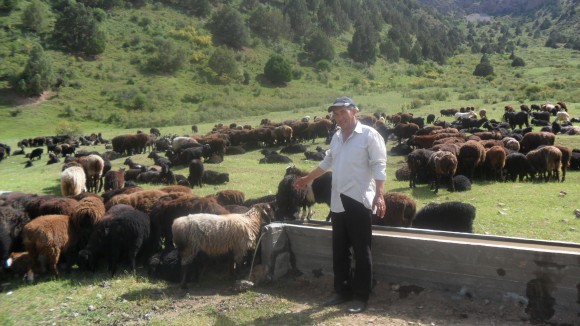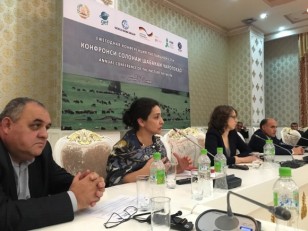Tajikistan owns 3.8 million hectares of pasture lands, 80% of which in the Zarafshan region (Sughd region), one of the main areas of intervention for ACTED in Tajikistan.
However, the prevalence of overgrazing due partly to the shortage of necessary infrastructure, insufficient financing, non-compliance with pasture use regulations, and an overall lack of knowledge on sustainable pasture management, bring to a damning conclusion: most pasture lands of Tajikistan, and particularly in the Zarafshan region, are degraded. ACTED worked in the Sughd and Murghab regions to prevent pasture degradation: here are some insights into the implemented activities.
Livelihood in rural areas threatened by pasture degradation
With pasture remaining one of the key economic activities in rural areas, in particular in remote mountainous regions like in the Murghab Plateau within the Pamir, one of the highest mountain range in the world, the livelihood of the local population is directly threatened by the environmental degradations, due also to the impact of climate change. Only small variations of average temperature have a direct impact on the eco-system of pasture communities. For instance, the extension of the grazing season due to higher temperatures is causing over-grazing, which provokes irreversible degradation of agricultural and pasture lands.

Supporting Pasture User Unions
ACTED is one of the key international actors contributing to preventing pastures degradation in Tajikistan. In particular, ACTED believes that civil society can play an essential role in supporting sustainable pasture management. It is for this reason that, as part of a consortium led by HELVETAS Swiss Intercooperation and including GIZ, ACTED is promoting the creation of Pasture User Unions in the Aksu Watershed located in the Syrdarya River Basin (Sughd Region).
In addition, ACTED has also built the capacity of existing Pasture Unions in Murghab through technical training on pasture management.
Pasture Unions are community-based organisations working on pasture management, which can play an essential role in preventing pasture degradation by advocating at the local and national level for more favorable rules and implementing sustainable pasture management approaches in its area.
Towards a new National Pasture Users Association?
To conclude the intervention in Murghab, ACTED organized a Regional Policy Forum with the participation of 350 key pasture management stakeholders from national and local authorities, pasture users from Kyrgyzstan and Tajikistan and the media. The event confirmed the need for further support to pasture users to maintain the momentum and shifts towards more sustainable development.
Discussions continued at the national level on the occasion of the Annual Conference of the Pasture Management Networking Platform (PMNP), which took place in Dushanbe on 23 November 2017.

This was the occasion for ACTED to present the results of its two main projects on pasture in Sughd and Murghab, and to discuss with key international and national stakeholders how to further bring support to Pasture User Unions to prevent pasture degradation. Participants included pasture users from all over the country, key decision-makers and international donors such as GIZ, the initial founder of the platform, IFAD and the World Bank.
Pasture users expressed the need to better cooperate with botanical specialists and the challenges of staying informed both on the latest scientific methods to preserve pasture and on the regulatory developments, and ACTED’s suggestion to create a new National Association of Pasture Users dedicated to defending pasture users’ interests was very much welcomed.
The pasture users should play a more active role in promoting their interests in the reform processes of pasture legislation.
To bridge the knowledge and management gaps of pasture users unions, pasture user’s representatives welcomed the suggestion of establishing a dedicated National Pasture Users Associaton. This association would give a voice at national level to pasture users and facilitate their involvement in the reform process to promote sustainable pasture management in Tajikistan.
